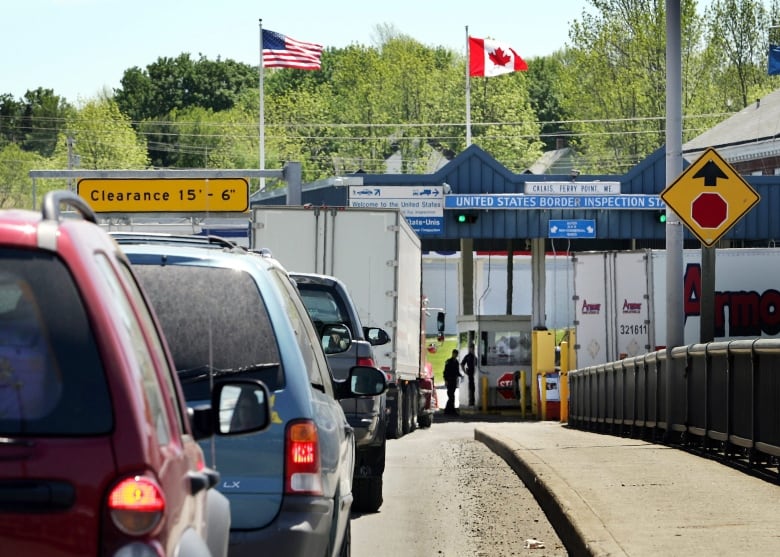If no deal is reached, Canadians travelling with dogs may not be able to cross the U.S. border in August.
The recently announced rule changes from the U.S. Centers for Disease Control, which go into effect Aug. 1, require all dog owners to microchip their pets and submit CDC dog importation forms, among other requirements.
However, part of the CDC import form requires that a section be filled out by the dog’s veterinarian, with the approval of an “official government veterinarian” in the exporting country.
However, the Canadian Food Safety and Inspection Agency, which would be the government body responsible for approving the CDC form, said it was unable to provide approval.
“Please note that the CFIA is unable to issue export document authorization for dogs entering the United States at this time as the process is under discussion with the CDC,” the CFIA website reads.
“The CFIA recognizes the concerns and impact that the CDC requirements have on Canadians. We have shared this information with the CDC to support the development of a more streamlined process for Canadians.”
The website says that the CFIA is “continuing to actively collaborate” with the CDC to develop a specific procedure for dogs traveling from Canada to the United States, and that more information for travelers with dogs is expected in mid-July.
In an emailed statement, CDC spokesman Dave Daigle said the agency is aware of concerns about the dog importation rule.
“We appreciate the feedback we have received from various countries, industry partners and the public and are actively working with federal and international partners to discuss the feedback we have received,” Daigle said.
The new rules are designed to protect the public from diseases that can be transmitted from dogs to humans, including rabies, he said.
“Canine rabies is a deadly disease that was eliminated from the United States 17 years ago. These measures were designed to allow the continued importation of dogs while minimizing health risks,” Daigle said.
In an email statement, a CFIA spokesperson said it expected “more information will be available next week” and urged dog owners to check the agency’s website for updates.
The NB Veterinary Association was left “in the dark”
“We didn’t expect these sudden new changes,” said Nicole Jewett, registrar with the New Brunswick Medical Veterinary Association.
He said the Canadian Veterinary Medicine Association and the CFIA have begun discussions with the CDC to try to find a solution before the deadline.
“As soon as we have the final rules, we’ll be able to put a plan in place for how to execute that. But until then, we don’t really know what might change from week to week until Aug. 1,” Jewett said.
She urged dog owners to continue checking the CDC website for updates and said she understands the stress they may be feeling.
“We’re pretty much in the dark,” Jewett said.
In addition to the uncertainty surrounding the ACIA, there is uncertainty as to whether New Brunswick veterinarians will have the capacity to complete the required forms.
Jewett said there is no data on how often New Brunswick dog owners cross the border into the United States, so it’s hard to say how often veterinarians will need to fill out the form.
“It’s definitely possible that this will all work out, and we’ll find a way that works for both of our countries, and it will be easy and simple,” Jewett said. “Or it could be more complicated. And we don’t know yet.”
The vet at the border says to wait for clarity
Natalie Rosamund is a New Brunswick veterinarian whose clients may be more affected than others. Based at Mayfield Veterinary Clinic in Dufferin, just outside of St. Stephen, she sees clients in both New Brunswick and Maine.
“Right now, what I am honestly telling people is to avoid crossing the border for the first few days of August, if possible, until the situation calms down,” Rosamund said.
While she and other veterinarians are doing their best to reassure clients, there still isn’t enough information available, she said.
While strict regulations regarding animals crossing international borders are not uncommon, “I think the difference here is the close relationship between Canada and the United States and the fluidity of the border,” Rosamund said.
She said she is unsure how this will affect her Maine clients and whether they will have to arrange paperwork to travel home from the clinic.
Customers on Campobello Island also pose a problem for Rosamund, as they can only reach the rest of New Brunswick by crossing into Maine, outside of the summer months when there is a ferry to the mainland.
He said the CVMA will host a seminar next week for Canadian veterinarians on the new border regulations with the United States and hopes the CFIA will provide more clarity later.
“I don’t want people to panic. It’s not the CFIA saying ‘we’re not going to help you.’ They’re saying ‘wait and let us find out,’ that’s my interpretation,” Rosamund said.
#Disagreement #border #rules #dogs #halt #canine #travel #CBC #News
Image Source : www.cbc.ca
